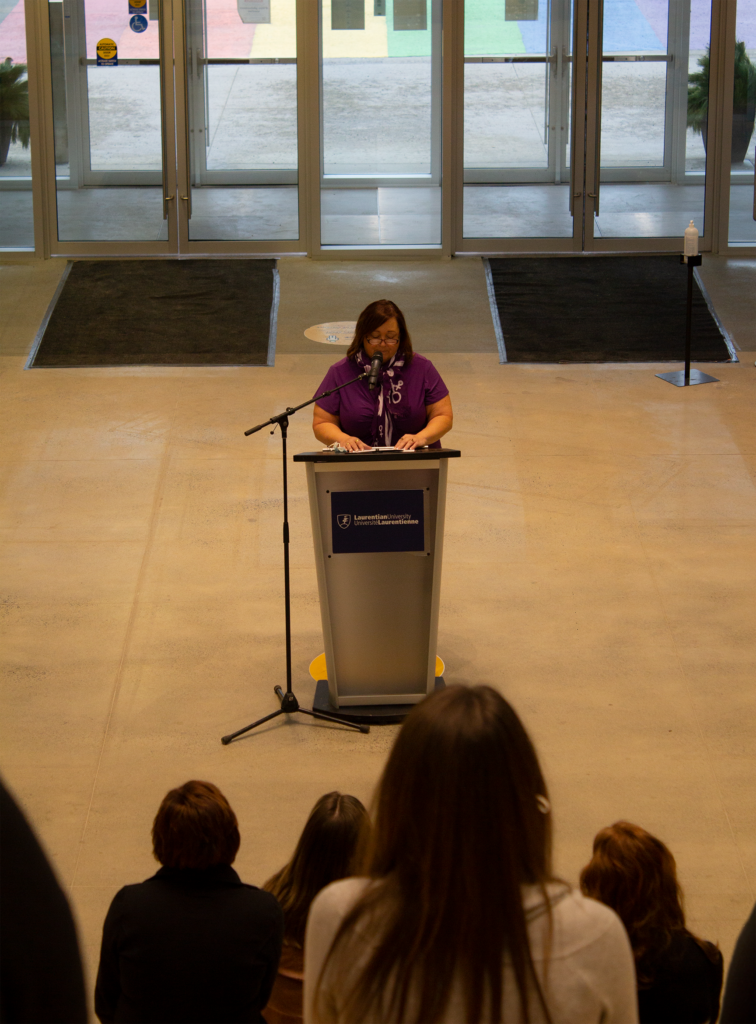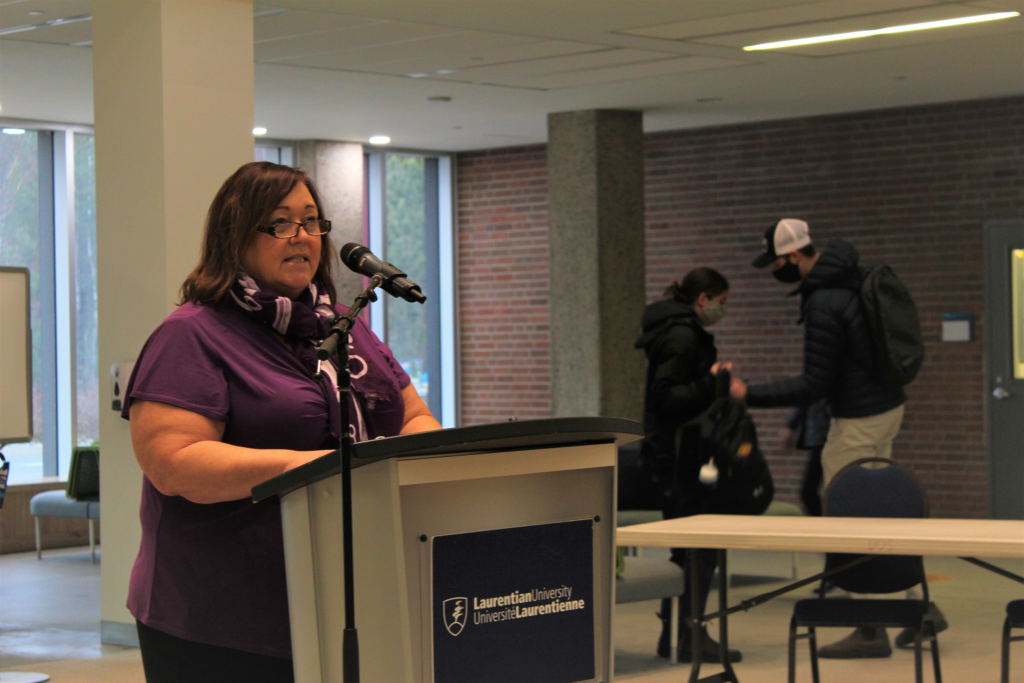
Hello, bonjour, Aaniin,
My name is Marlene Gorman, and I am the Executive Director for YWCA Sudbury and an Executive Member of the Greater Sudbury Coalition to End Violence against Women. I bring greetings from YWCA Sudbury Board President, Paula Riccio and Maya Roy, CEO of YWCA Canada.
I first want to acknowledge that YWCA Sudbury is situated on the lands of Anishinaabek territory, and Robinson Huron Treaty territory.
Those of us who are settlers, myself included, are implicated in the ongoing dispossession of Indigenous people from this land in which we participate.
As an organization that supports women escaping violence, we must acknowledge the direct connection that land based violence has on women. We must also acknowledge that the theft and dispossession of Indigenous land is inseparable from the continued violence against Indigenous women and 2 spirit folks and in turn inseparable from the work we are doing today.
We also seek to recognize the contributions Métis, Inuit, and other Indigenous peoples make, in shaping and strengthening this community and other communities as well.
As settlers, this recognition of ongoing settler colonialism must go beyond spoken words to make real our collective commitment to the Truth and Reconciliation 94 calls to action in our communities and, in particular, to bring justice for murdered and missing Indigenous 2spirit people, women and girls across what is known to settlers as Canada.
We honour our grandmothers, mothers, daughters, sisters, aunties, cousins, friends, and Two Spirit, Lesbian, Gay, Bisexual, Transgender, Queer, Questioning, Intersex, and Asexual Plus people who have gone missing or have been murdered, as well as the survivors of gender- and race-based violence and the families who lives have been altered forever. Our work is guided by your voices – we will always remember.
Today is the International Day for the Elimination of Violence Against Women and the launch of 16 Days of Activism.
This date, the 25th of November was chosen to commemorate the Mirabal sisters, three political activists from the Dominican Republic, who were brutally assassinated in 1960 during the Rafael Trujillo dictatorship (1930-1961).
I welcome the chorus of voices calling for an end to the violence that affects an estimated one in three women in their lifetime. I applaud leaders who are helping to enact and enforce laws and change mindsets. And I pay tribute to all those heroes around the world and in our community who help victims to heal and to become agents of change.
We usually sell and wear the purple scarf that is a symbol of the courage it takes a woman to leave her abuser. This year, the Greater Sudbury Coalition to End Violence Against Women is raising purple flags around the City to raise awareness and send the message that the courage of the woman is not enough. It takes the support of an entire community to end violence against women. We will also be posting key messages to raise awareness and invoke hope during the 16 Days of Activism. Follow our facebook page 16 Jours, 16 Days and join us at the December 6th Vigil. Details are on the page.
Canada is at cross-roads when it comes to violence against women and gender-based violence (VAW/GBV): a perfect storm of colliding pandemics—COVID-19, and the pre-existing WHO declared pandemic of VAW/GBV1—has created both the conditions for escalating harms of violence, and the opportunity for real and lasting change.
Today on the International Day for the Elimination of Violence against Women, and every day, we must stand up, speak out and be part of creating solutions to end these human rights violations.

Leaders have a responsibility to take action to end all forms of gender-based and race-based violence.
Today an estimated one in three women will be subject to violence in her lifetime. One in three girls will be married as a child bride before the age of 18. Approximately 125 million girls and women in the world have suffered female genital mutilation.
Trafficking ensnares millions of women and girls in modern-day slavery. Rape is a rampant tactic in warfare. And femicide, the murder of women because they are women, is on the rise.
Violence against women and girls is a gross human rights violation that knows no borders and it affects women and girls of all ages, all income levels, all races, and all faiths and cultures. From conflict zones to urban spaces to university campuses, this violence compels all of us to be preventers of this pandemic and to take action NOW. The vast majority of cases go unreported and unacknowledged and survivors are left wounded, invisible and suffering in silence. This situation is intolerable.
Today I call on leaders to show determination and mount a response that is proportionate to the violence threatening the lives of women and girls. It is time to take the necessary measures, in line with international human rights standards and the agreement reached by the Commission on the Status of Women, to prevent and end violence against women.
To be effective, prevention must address its root cause: gender inequality. We need education in schools that teaches human rights and mutual respect, and that inspires young people to be leaders for equality. We need equal economic opportunities and access to justice for women. We need women’s voices to be heard. We need more women in leadership positions.
Let us continue to explore innovative prevention strategies and employ technology, including mobile technology, to raise awareness and protect women’s rights.
We need to protect women and girls from being violated and when violence takes place, we need to ensure access to essential services for all survivors. This includes health services, shelters, hotlines, police, justice and legal aid. We must ensure that women and girls are safe and that perpetrators are held accountable for their crimes and brought to justice.
Ending gender- based violence needs political will and adequate resources. We need to finalize and implement Canada’s National Action Plan to End Gender-Based Violence, led by Women’s Shelters Canada.
We can end this pandemic of violence:
- By improving economic security and ensuring equitable access to public services and social infrastructure.
- By transforming the norms and narratives that support VAW and GBV and by negatively sanctioning VAW and GBV at personal, interpersonal, community, and societal levels.
- By ensuring that Legal and justice systems consider the lived realities of survivors and protect them from further harm, and
- By providing equitable access to support services that are timely, reliable, and inclusive.
And finally, it also needs people around the world who raise their voices and, in our case, their flags, and this is what the commemoration of this day is all about.
Please take time today to also recognize and explore your own role in addressing ongoing systemic racism and colonial violence.
Thanks!